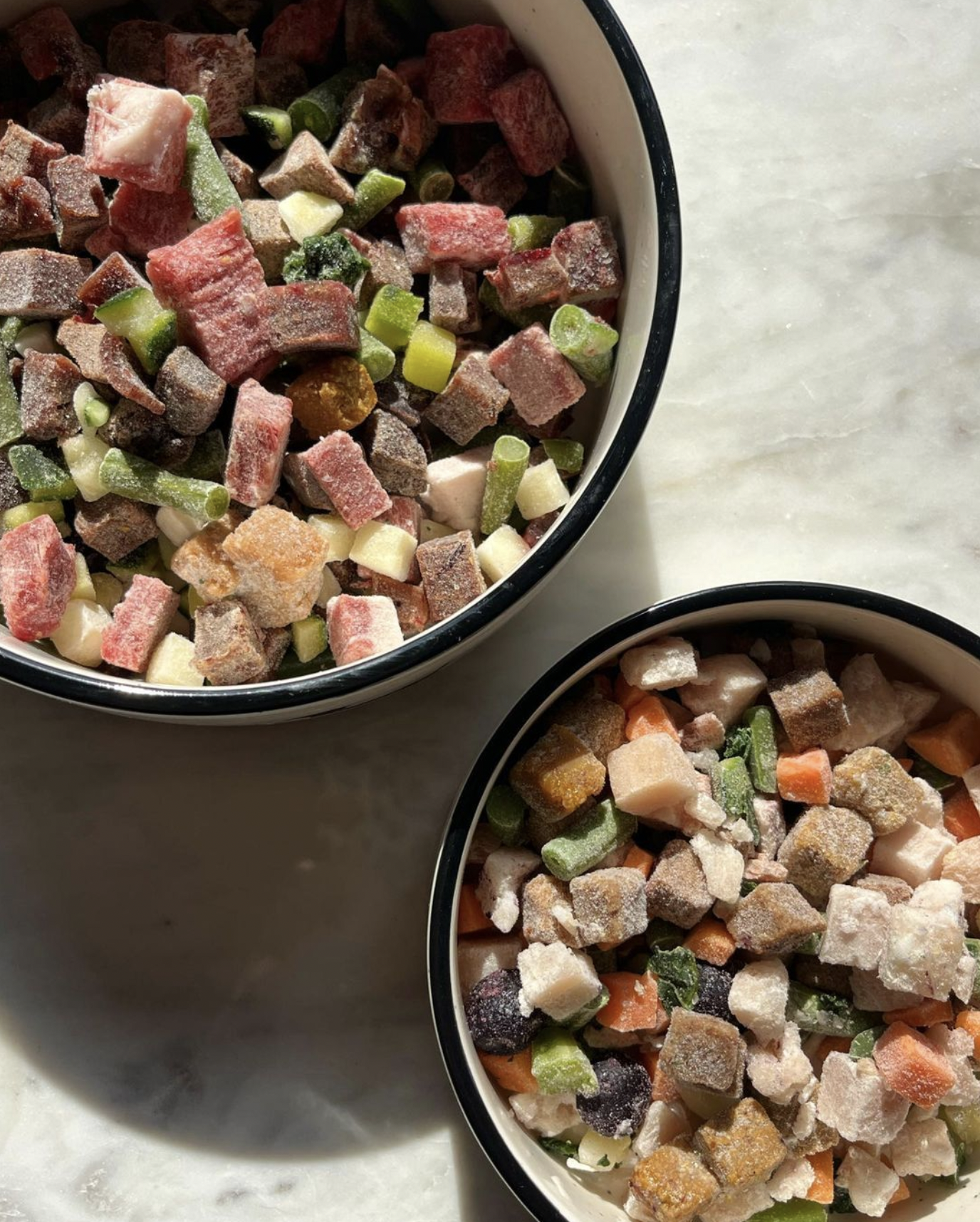Giving a Dog a Bone (and Other Table Scraps) May Literally Make Them Healthier
No matter your species, health begins in the gut. With that in mind, one of the most impactful decisions you can make on behalf of your dog is the source of their daily nutrition. Good news: if you’re someone who typically feeds your dog food scraps straight from the table — turns out, you may have been bolstering their digestive health, unknowingly.
Like humans, early lifestyle and diet play a pivotal role in our dogs’ digestive and whole-body health — and ultimately, their longevity. A 2023 study found that puppies and adolescent dogs who ate table scraps (namely unprocessed foods like raw red meat, organs, fish, eggs, tripe, bones, cartilage, vegetables, and berries) experienced fewer gastrointestinal issues later in life. In fact, puppies that chewed on cartilage and raw bones were 33 percent less likely to develop gut issues.
Conversely, the study found that feeding a highly processed, carbohydrate-heavy diet (i.e. dry foods like kibble and rawhides) significantly increased the risk of long-term gastrointestinal health issues (known in canines as “chronic enteropathies” — similar to human irritable bowel diseases). Symptoms typically last for at least three weeks and include diarrhea, vomiting, gas, decreased appetite, nausea, and even weight loss.
Unfortunately, canine GI diseases happen often and early. A Finnish survey of 7,000 dog parents from 2009-2019 found that 22 percent of puppies and 18 percent of adolescent dogs experienced gastrointestinal symptoms with an average onset age of around a year and a half.
Though genetics also contribute to long-term health issues, the next best predictors of canine GI diseases are inextricably linked to the status of their gut health — specifically a poor diet’s effect on lower gut microbial diversity and a lack of the essential micronutrient, Vitamin D. Without which — digestive issues are more likely to occur.
Due to daily nutrition’s impact on the health of the gut — dog parents may need to reconsider what they reach for in the dog food aisle as well as the people-food aisles. Because dogs and humans live side-by-side — symbiotically — our style of eating also influences our dogs’ day-to-day well-being and overall health.
So, what are some proactive decisions dog parents can make today that will be preventative later?*
Just as we are encouraged to avoid consuming a highly processed diet (i.e. the Standard American Diet), we should also avoid feeding our dogs highly processed foods (i.e. kibble and even many “fresh” dog food options which rely on fillers or binders like carbs for shelf-stability and experience high-heat nutrient degradation during processing). Like sugar in humans, carbohydrates in dogs may also cause low-grade inflammation, immune function issues, and obesity.
Instead, feed your dog high-quality, human-grade, unprocessed foods (and some whole vegetables and fruits) to support their body’s absorption of key vitamins, minerals, and macro and micro nutrients.
Teething and training treats matter, too. The study also revealed that puppies who ate blueberries — an excellent source of fiber which supports bowel regularity — also had lower occurrences of gut issues. Puppies that chewed on rawhide were 117 percent more likely to develop stomach problems in adulthood, but puppies that ate berries were 29 percent less likely.
Big Takeaways: grilling steaks or baking a chicken? Sneak your dog a few bites from your plate. Dining out? Take home a doggie bag. Heading to your local butcher? Grab them a special cartilage treat. Tired of food waste? Save the leftovers.
And as the old adage goes — give a dog a bone.
*When it comes to supporting your dog’s unique biology and digestive function, there is no one-size-fits all approach. Nutrition ought to be personalized to meet their evolving health needs based on their lifestyle, breed type, weight class, medical history, and beyond. As always, we recommend discussing the range of nutrition options with your vet prior to switching core sources of nutrients as well as transitioning your pet slowly as it can take time for their gut microbiota to adapt. To learn more about the health benefits of feeding your dog a raw food diet, read our 10-Day Transition Guide.
SOURCES:
Magazine, S. (2023, February 14). Eating table scraps and raw food may help protect dogs against stomach issues. Smithsonian.com. Retrieved March 21, 2023, from https://www.smithsonianmag.com/smart-news/eating-table-scraps-and-raw-food-may-help-protect-dogs-against-stomach-issues-180981634/
Vuori, K.A., Hemida, M., Moore, R. et al. The effect of puppyhood and adolescent diet on the incidence of chronic enteropathy in dogs later in life. Sci Rep13, 1830 (2023). https://doi.org/10.1038/s41598-023-27866-z


